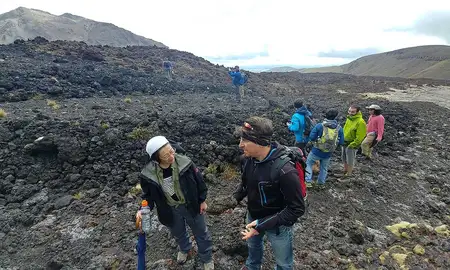
Project lead Associate Professor Carol Stewart of the School of Health Sciences doing field work on Yasur volcano, Tanna, in January 2018.
Volcanic eruptions pose a substantial risk in Aotearoa New Zealand, with there being over a 50 per cent probability of an eruption from Mount Ruapehu within the next 50 years, along with a 30-50 per cent probability of eruptions from Taranaki Mounga, Mount Ngauruhoe and Mount Tongariro. The resulting volcanic ash and gas emissions from these eruptions could cause long lasting effects to large downwind areas of Te Ika-a-Māui North Island.
While Aotearoa has world-leading expertise in studying ash impacts on infrastructure and buildings, there has been very little research conducted, here or internationally, around how buildings and infrastructure would be impacted by volcanic gas. Dr Stewart says she is thrilled her team have secured the funding from Toka Tū Ake to help rectify this.
“The funding will enable us to carry out a comprehensive field and laboratory-based study that addresses a major knowledge gap about the impacts of volcanic gases on our built environment, including our housing stock. This work is the first of its kind internationally and will be of considerable interest to places such as Iceland and Hawai’i where volcanic gas plumes frequently affect infrastructure systems, buildings and downwind populations.”
The project will take place at a study site set up in Rotorua, where there are high gas emission rates and where accelerated corrosion of building materials has been recorded by the team’s research partners from the Building Research Association of New Zealand (BRANZ).
Dr Stewart says through experimental design, the team will be able to address several pressing questions.
“Through the project, we aim to develop a quantitative understanding of the relationships between volcanic gas concentration and metal corrosion rates. We’ll be able to investigate how rapidly corrosion is initiated, whether there are different corrosion products in volcanic versus coastal environments, which is useful in distinguishing causes of corrosion, and how gas concentrations in the atmosphere affect rates of corrosion.”
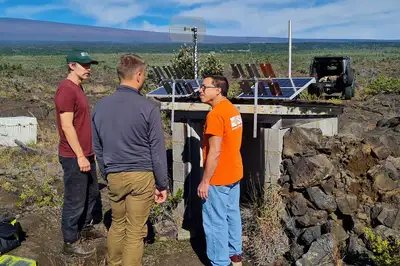
Installing corrosion test panels downwind of Kilauea volcano, Hawai’i, in December 2022. With team member Dr Graham Leonard (centre) and United States Geological Survey colleagues.
A novel aspect of the study involves the investigation into the combined corrosive effects of volcanic ash and gas. Dr Stewart says the team will be dosing the test panels in their field study with contrasting types of volcanic ash.
“We will use a ‘salty ash’ sample collected on Tongatapu after the January 2022 eruption of the Hunga volcano, which serves as a suitable comparative sample of a future underwater eruption in the Auckland volcanic field. We also plan to use ‘acid ash’ samples with a strongly acidic surface coating, typical of recent eruptions from Ruapehu, Whakaari and Tongariro volcanoes.”
One of the main outputs of this project will be an authoritative database of building materials’ durability in Aotearoa’s volcanic and geothermal environments.
“Our project will assess the performance of important materials such as mild steel, which is used as the base material for many steel structures, copper, which is widely used in power distribution systems and aluminium and zinc coatings, which are used in roof and wall claddings, in volcanic gas environments. Alongside offering insight on the durability of these materials, we’ll be able to provide recommendations on how corrosion may be avoided and mitigated,” Dr Stewart says.
The work will also be used to inform engineering design practices to help the industry identify durable materials to increase the resilience of Aotearoa’s built environment to volcanic emissions.
Dr Stewart explains that the findings will help direct Aotearoa’s volcanic risk management community.
“The data will inform new volcanic hazard and risk models for an improved understanding of the vulnerability of the built environment to future volcanic eruptions. This can, in turn, inform investment decisions, including by iwi and hapū-based entities who own and manage a diverse range of assets, some of which are naturally tied to volcanic and geothermal environments.”
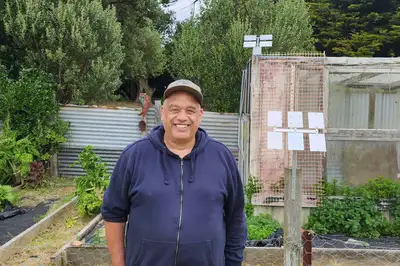
Kelvin Tapuke, project team member, local engagement manager and Senior Research Officer at Massey University’s Joint Centre for Disaster Research, next to a corrosion test rig.
Toka Tū Ake EQC’s biennial grants for 2023 have awarded more than $1.2 million to 14 research teams from nearly 80 expressions of interest. The grants fund projects that aim to better understand natural hazards risks.
Head of Research at Toka Tū Ake EQC Dr Natalie Balfour says each of the 14 research projects will help strengthen Aotearoa’s resilience when natural disaster events do happen.
“Investing in science and research is critical, as is translating it into tangible and appropriate outputs for others to use. If we can put sound data and research into the hands of key decision-makers like policy makers, local councils, designers, engineers, builders and most importantly, the New Zealand public, that’s when we can start making a difference.”
Related news
Ash samples provide vital information for volcanic eruption response
Massey University’s Associate Professor of Environmental Health Carol Stewart plays a crucial role in determining the extent and types of health hazards people will be exposed to in the aftermath of a volcanic eruption.
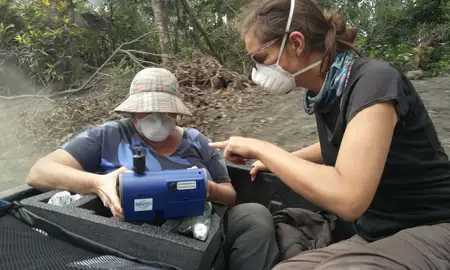
New Zealand’s communication of volcanic risk under the spotlight
New ground-breaking research could drive fundamental changes to the way New Zealand agencies communicate and respond to volcanic risk.
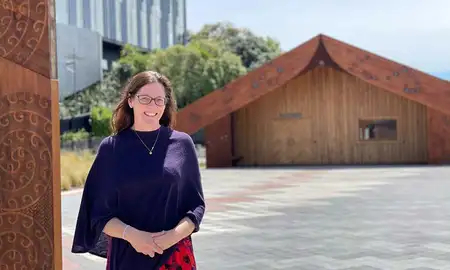
Workshop tackles international volcanic risks
How accurately can we forecast the hazards and impacts of volcanic eruptions? How can we advance our computational modelling techniques to mitigate effectively against volcanic fatalities?
